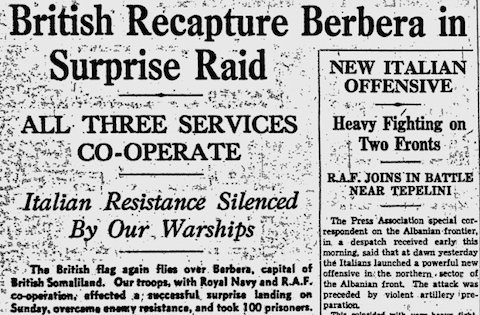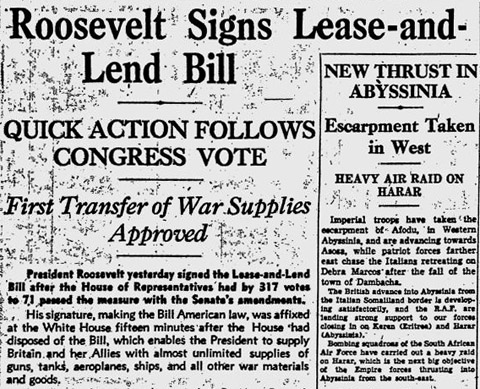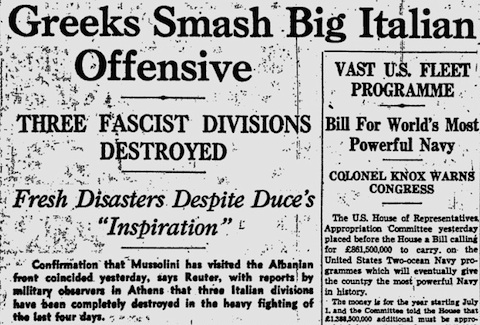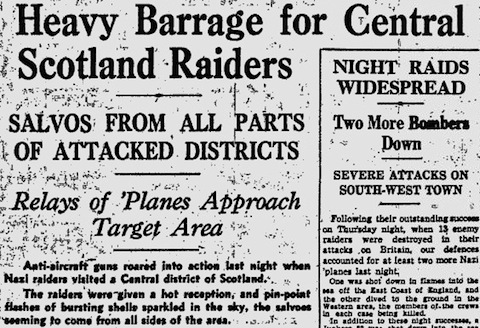
By recapturing from Italian forces Berbera, the capital of British Somaliland, a small part of the British Empire has been restored. Royal Navy warships landed Army troops at the port, suffering ‘negligible’ (Glasgow Herald, 5) casualties. RAF armoured cars assisted too.
This adds to the Allied offensive against Addis Ababa: ‘British Empire troops are now steadily closing in on the heart of the Italian Empire from 13 points’, according to a military representative in Cairo. The Herald noted that when the Italians attacked British Somaliland, they spoke of ‘the “expulsion of the British from the Western shore of the Red Sea,” and of the “enormous effect” it would have on the Arab world’. That was just seven months ago, so this effect didn’t last very long.
Otherwise, most of the news of the war against Italy is aerial in nature. In Tripolitania, the RAF carried out heavy raids against aerodromes at Castel Benito and Makina (‘R.A.F. SMASH TRIPOLI AIRPORTS’, 5). It has been bombing Italian aerodromes and ground positions in Eritrea, Abyssinia, Greece and Albania — in its first air raid, Tirana received ‘more than ten tons of bombs on the aerodrome and military objectives’ on Sunday morning. But the Regia Aeronautica is evidently not yet a broken reed. An unconfirmed report says that Britain has warned ‘that the R.A.F. would bomb Rome if the Axis bombed Athens’ (6). In a different kind of response, Alexandria will use £10 million worth of frozen Italian assets to ‘compensate the victims of the Italian air raids on the city’.
German aircraft were back over Scotland last night and yesterday, but only in small numbers. One bomber ‘machine-gunned streets’ (5) in a North of Scotland town, but no injuries are reported.
Thomas Johnston, Secretary of State for Scotland, was in town yesterday to attend funerals for blitz victims and to check up on ‘arrangements for the restarting of vital activities of the community’. He said the Clydeside blitz was ‘severe as any that has been suffered by any area in Britain’. Both he and Rosebery, the Regional Commissioner, praised the people’s spirit. Rosebery noted that Clydeside was ‘the first area in Scotland to bear the full weight of the cowardly Luftwaffe’:
The attacks were, as usual, concentrated very largely on residential quarters. Many homes were destroyed, and many women and children are among the killed and injured, but the morale of Clydeside is even higher than it was before the raids started.
A letter from a local MP, Major E. G. R. Lloyd, makes similar points while reflecting upon the ‘stoic endurance’ of Clydesiders: ‘My visits have filled me with pride and emotion. The civilian population has been magnificent’. But he also injects a political note:
Nor could one fail to be impressed with countless acts of human kindness and brotherhood which everywhere prevailed — incidentally completely breaking down the foolish and artificial class barriers, which, I trust, this war will do much to remove finally.
There may be some evidence for Lloyd’s thesis in today’s paper. Or not. A strike by five hundred Glasgow carters ended yesterday after receiving wage increases of 3s a week and double time on Sundays. An official of their union, the Scottish Horse and Motormen’s Association referred to the recent blitzing, implying that it played a part in the settlement:
“After the trouble of the past few days,” he said, “it is a good thing to see the men going back to work and pulling their weight. We never doubted they would do so if the call was made upon them.”
But if the end of that strike is put down to the Blitz breaking down class barriers, then what are we to make of one of the Herald‘s leading articles, which makes pretty much exactly that claim about the carters (and an apprentices’ strike), but then goes on to attack dockers for rejecting the Ministry of Transport’s plan for reorganising Glasgow Harbour? (4)
After the events of Thursday and Friday any unconvincing objections to plans for expediting the work of Glasgow Harbour will fall on deaf ears. And no promises to work “with all possible speed” will put a better complexion on matters […] Surely it should not be too much to hope that the public-spiritedness displayed by boys and carters will also be shown by Glasgow dockers.
Is it realistic to expect class warfare to stop just because real warfare has started?
A couple of familiar (to me) names pop up on page 6. Air Commodore J. A. Chamier visited Glasgow yesterday to visit the local headquarters of the Air Training Corps. He claimed that the ATC was providing the basis for the RAF’s massive expansion.
Four-fifths of this great Air Force would require to be recruited from lads who, through social circumstances, required to leave school at 14 and work for their living. It was the task of the Air Training Corps to give them required standard of education, discipline, and preparatory training.
Otherwise, though they might have ‘the “guts and physique” to fly with the R.A.F.’, they would not have ‘an adequate education in mathematics and kindred subjects’. Chamier is Commandant of the ATC; it is his brainchild. He is also Executive-Controller of the Air League of the British Empire. (And, ahem, fellow traveller of the right.)
The other familiar name is the Rt Hon. Robert Menzies, KC, MP, Prime Minister of Australia. Ming is in Britain to get a ‘good eyeful’, and described Churchill as ‘a bobby-dazzler’ and ‘a real crackerjack’.
![]() This work is licensed under a Creative Commons Attribution-NonCommercial-NoDerivatives 4.0 International License.
Permissions beyond the scope of this license may be available at http://airminded.org/copyright/.
This work is licensed under a Creative Commons Attribution-NonCommercial-NoDerivatives 4.0 International License.
Permissions beyond the scope of this license may be available at http://airminded.org/copyright/.





I’m finding it very hard to criticise John Chamier’s priorities from this distance.
It’s also worth bearing in mind that his idea of “flying for the RAF” involved improving aircraft radios. “Physique” might jump out of his comments, but the “mathematics and kindred subjects” will turn out to be more important in the end. Am I too romantic in seeing Chamier’s boys, come from driving in horsedrawn wagons through the rainy Clydeside streets, to fiddling with their hi-fi cabinet before guiltily swiping the Playboy off the top when the kids come running in?
Oh, look. I’m going all Happy Days.
“In other news, RAF Typhoons attacked hostile ground positions outside Benghazi.” Oh, sorry, that’s not 1941; that’s next week.
Erik:
Perhaps I didn’t paraphrase/quote Chamier very well, his comments about maths/science training were definitely the point, not the ones about their physique. He turned out to be fairly far-sighted in this regard, I think. It’s a bit progressive too, despite his fascist leanings.
Alan:
Or next post :)